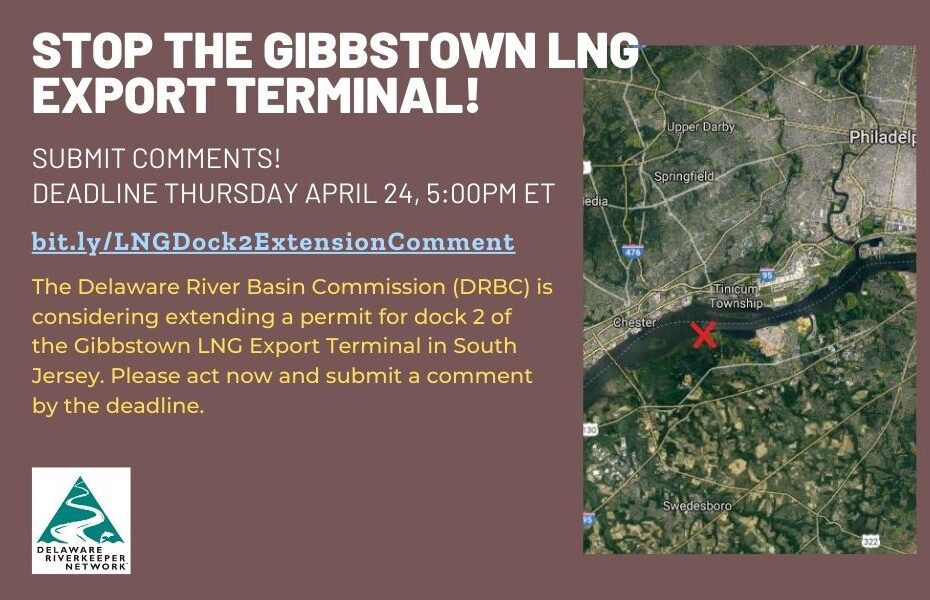Comments Due 5pm, Thursday, April 24 – Here’s an easy way to speak up
We have a just a few days to speak up to the Delaware River Basin Commission (DRBC) to tell them NOT TO APPROVE the permit extension that the developers of the proposed Gibbstown LNG Export Terminal are seeking. This highly dangerous, polluting, and obsolete proposal to export Liquefied Natural Gas (LNG) overseas from New Jersey on the Delaware River must be stopped NOW, before any construction begins. This is the moment when we can finally kill this project and prevent its destructive harm!
Background: The DRBC gave its original approval of DOCK 2 (the LNG Export Terminal) to Delaware River Partners (DRP, affiliate of New Fortress Energy) in 2019, after the public fiercely fought this massive, dangerous LNG export project. It was contested in court, in the end was approved, but has not been constructed. DRP successfully got an extension in 2022, again over public outcry. Now they have applied for yet another 3-year extension and DRBC is considering it despite the fact it is obsolete and should be cancelled entirely.
Please submit written comments today! Two options available.
The first option is very easy. We will submit your comment for you. Click here to fill out the form and submit your comment.
OR
Alternatively, you can submit a comment directly to the DRBC with the button below. Use the sample letter with suggested talking points below to help write your comment:
This second link goes directly to the DRBC portal where you input your comment yourself. Copy and paste this sample letter (below) with suggested talking points in the DRBC comment form. Feel free to make your own edits.
To the Delaware River Basin Commission (DRBC):
I oppose the extension of the approval for the Gibbstown LNG Export Project (“Dock 2”) and call for DRBC to deny the permit.
The approval must be denied because the application does not meet the required criteria:
- There has been material change to the approved project:
- Rail cars can no longer be used to transport LNG to the Gibbstown site because LNG by rail is prohibited by law and the Pipeline and Hazardous Materials Safety Administration (PHMSA) denied the company’s Special Permit request. DRP must transload only from trucks to ship, requiring many hundreds of trucks each day and different infrastructure. The truck traffic and transloading will pollute the air, threaten spills, and pose a high risk of dangerous accidents;
- The Gibbstown site’s condition has changed substantially due to the currently-pending construction of a vast network of underground storage cavern systems to store liquid gases under the LNG facility. A NJ Dept of Environmental Protection draft permit for the proposed caverns is currently out for public review. It would be the largest cavern system in the state and compounds the site’s unacceptable dangers and pollution potential;
- There are critical federal approvals pending for the project that could change it and the DRBC’s Comprehensive Plan substantially:
- The Federal Energy Regulatory Commission (FERC) has not ruled on the company’s request that FERC declare that the export project does not fall under FERC jurisdiction, a decision that has been pending for several years. One year ago, FERC checked back with the company asking if they still planned to build the terminal since transport of LNG to the facility by rail car was no longer an option. DRP responded they would use trucks instead but that they were waiting for FERC to rule on whether they had jurisdiction before the company made a final decision. What this project would actually look like is unknown, even the company admits that it could change significantly. DRBC must deny.
- The required Army Corps of Engineers approval for the project has expired and DRP’s application is under administrative review; it is unknown if this approval will be issued and/or will change fundamentally.
- DRP has not “diligently pursued” the project, which is required if they are to be eligible for an extension:
- The company states “due to market conditions and other factors, construction has been delayed”. They could have constructed the project but intentionally delayed it as an investment decision. This is NOT grounds for an extension, DRBC must deny.
- DRP submitted a ledger to show the funds they have spent on the project. It is a long list of expenditures data back to 2018, when the company was still hiding that they were planning to build an LNG export terminal and DRBC had not publicly reported it. The expenditures are not explained and include item such as taxes paid to the township and items that could have been for their facility to store, market, and export other products such as natural gas liquids (NGLs), which they export today from Dock 1. DRP is throwing the kitchen sink onto a spreadsheet with no factual proof they have been materially and substantially investing in the project;
- The liquefaction plant that was supposed to be built in Wyalusing Township, Bradford County, PA four years ago for transport down to Gibbstown, has not been constructed and PADEP permits have expired. There is no information available about where the company would get LNG to export from the proposed Gibbstown terminal, demonstrating a lack of project viability and diligence by the company.
- DRP already received one extension, it is not clear from DRBC’s regulations if a second extension is even allowed.
The project would have enormous environmental and public health impacts locally and for the entire region and the need for an LNG export facility has fundamentally changed as global markets and energy finance have evolved since 2022. It’s bad government to permit obsolete, environmentally costly projects to perpetuate. End the permit now, prevent the damage it would cause. DRBC must deny.- The Dock 2 LNG wharf would require dredging and river construction that would destroy irreplaceable habitat for the federally endangered Atlantic Sturgeon and other keystone marine life, including rare aquatic vegetation, and would stir up PCBs and other toxic pollutants that are now buried;
- The infrastructure for Dock 2 would require disturbance and interference with the cleanup of the polluted Gibbstown site, which is still undergoing remediation for pollution dating back over 100 years when Dupont manufactured munitions there;
- The operation of Dock 2 would bring enormous marine vessels to ship the LNG, larger than any ship that comes this far up the Delaware River today, jeopardizing communities. Each ship would hold the equivalent of the explosive energy of 67 Hiroshima bombs, threatening New Jersey, Pennsylvania and Delaware communities and infrastructure. The ships would also kill and/or harm critically endangered species such as the Delaware River’s unique Atlantic sturgeon ecotype with ship strikes;
- The operation of the facility presents a severe public safety threat exposing well over 1.2 million people to risk of exposure should there be an accident or a release of LNG. Hundreds and hundreds of LNG tanker trucks would have to travel approximately 200 miles across Pennsylvania from Wyalusing Township, Bradford County, where the LNG liquefaction plant is supposed to be built, across the Commodore Barry Bridge and into Gloucester County New Jersey around the clock every day. These trucks would carry highly flammable and explosive LNG, a hazardous liquid that can cause unprecedented catastrophe, including inextinguishable fire and explosion for the entire region and potential death for those in proximity.
- In the big picture, more LNG exports are a bad idea.
- They will layer more pollution on communities – it’s even worse for environmental justice communities that would be being saddled with more LNG pollution that is harming public health and shortening lives. This is true at LNG facilities and also where fossil gas is being fracked and transported such as in Pennsylvania, the second largest gas producer in the nation where the fracking industry has inflicted extensive damage to public health and the environment.
- LNG exports, including the proposed Gibbstown/Wyalusing export project, will make the climate crisis worse by pumping out greenhouse gases at the moment we must urgently reduce these emissions to avoid climate catastrophe. We need to develop truly clean renewables but these will be displaced by LNG increases.
- LNG exports drive up the price of gas for domestic users, including manufacturing and electric utility costs, harming those users who can least afford high heating bills. More LNG exports would result in excess supply and possible stranded assets when we should as a nation be investing in renewable, economically sustainable energy sources with reliable events for all. The worldwide glut of LNG will engender economic instability as demand wanes and investments sour.
Please deny the approval for this dangerous, polluting, unjustifiable and obsolete LNG export project!
Please submit a written comment by 5pm this Thursday, April 24.
Thank your for taking action to stop the proposed Gibbstown LNG Export Project!

